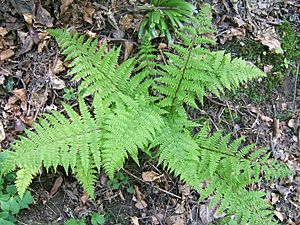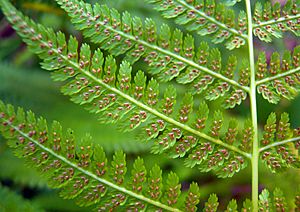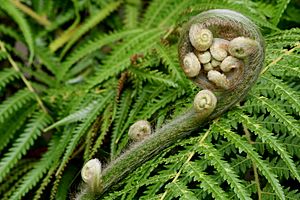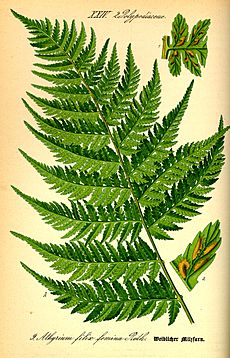Lady fern facts for kids
Quick facts for kids Lady fern |
|
|---|---|
 |
|
| Conservation status | |
| Scientific classification | |
| Genus: |
Athyrium
|
| Species: |
filix-femina
|
The Athyrium filix-femina, also known as the lady fern or common lady-fern, is a beautiful and large type of fern. It has a feathery look and grows naturally across most of the cooler parts of the Northern Hemisphere. You can often find it in damp, shady woodland areas, where it grows in large numbers. Many people also grow it in their gardens because it looks so nice.
The name "lady fern" comes from how its tiny reproductive parts, called sori, are hidden. They are not very noticeable, which was once thought of as "female." Another reason for its name is its elegant and graceful appearance.
What Makes the Lady Fern Special?
Today, scientists often divide the Athyrium filix-femina into three main types: the typical A. filix-femina, the A. angustum (which is called the narrow lady fern), and the A. asplenioides (known as the southern lady fern).
Lady ferns grow in a clump, meaning their leaves, called fronds, all grow from a central point. These fronds are a light yellow-green color and fall off each year, just like leaves on some trees. They can be anywhere from 20–90 centimetres (7.9–35.4 in) long and 5–25 cm (2.0–9.8 in) wide.
If you look closely at the underside of a frond, you'll see small dots. These dots are the sori, which contain the fern's spores for reproduction. Each tiny leaflet, called a pinnule, can have 1 to 6 sori. Each sorus is covered by a whitish or brown kidney-shaped cover called an indusium.
The fronds of the lady fern are very detailed, divided into three layers of smaller parts. The main stem of the frond, called the stipe, might have long, pale brown, papery scales at its base. The spores of A. angustum are yellow, while those of A. asplenioides are dark brown.
Lady ferns are very tough plants. They can handle cold temperatures, even as low as −20 °C (−4 °F), which helps them grow in many different places.
Growing Lady Ferns and Their Uses
Many different types of lady ferns, called cultivars, have been created for gardens. These are special varieties grown for their unique looks. Some of these have even won awards, like the Royal Horticultural Society's Award of Garden Merit. A few examples include:
- A. filix-femina
- A. filix-femina 'Vernoniae'
- A. filix-femina 'Frizelliae'
Did you know that young lady fern fronds can be eaten? They need to be cooked first. Native Americans used to cook both the young, coiled fronds (called fiddleheads) and the underground stems (called rhizomes).
Error: no page names specified (help). In Spanish: Athyrium para niños
In Spanish: Athyrium para niños





